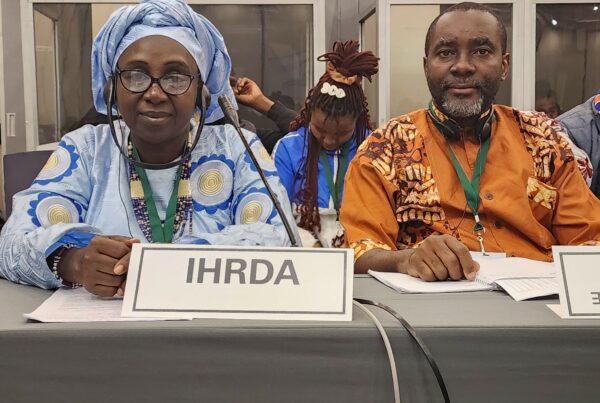The Tudun Wada community in Abuja faces possible eviction after an Abuja High Court ruling that the Right to Housing cannot be enforced in Nigeria until a specific law is passed by parliament to that effect. In a decision delivered on 16th December 2010, the High Court of the Federal Capital Territory (FCT) ruled the community had failed to prove their case against the Minister for the FCT and the Federal Capital Development Authority (FCDA).
The lawsuit was filed by seven members of the Tudun Wada on behalf of the whole community numbering about 10,000 after the FCDA placed bulldozers and other equipment, and police in riot gear, ready to forcibly evict the residents. This action had been taken in spite of several appeals from the community to the FCT Minister and the FCDA. The residents wanted to either be integrated into the Abuja Master Plan – the city’s development plan – or relocated in accordance with due process of law. The community has lived in Tudun Wada for over two decades and taken possession of the land in the village.
The community had argued that they had a right to housing by virtue of the Fundamental Objectives and Directive Principles of State Policy in Chapter 2 of the Nigerian Constitution. However, the Court ruled that Chapter 2 could not be questioned by any judicial, legislative or executive authority as stated in the Constitution itself. At best, the Constitution required that these authorities follow Chapter 2 in all their decisions. Referring to some earlier decisions of the Supreme Court of Nigeria, the Court decided that a matter under Chapter 2 of the Constitution could only be questioned by a judicial authority when the National Assembly had passed that specific matter into law.
With this background, the Court concluded that even though the community had argued that their right to housing, by interpretation, was protected by the African Charter on Human and Peoples’ Rights – which is part of Nigerian law – that right could not be enforced because the National Assembly had not specifically passed a law to requiring that housing be enforced as a fundamental human right.
The Court added that even if the people of Tudun Wada had an enforceable fundamental human right to property under Chapter 4 of the Constitution, they had failed to prove that they had legally acquired their land and homes in Tudun Wada with the approval of the FDCA. Consequently in the absence of such approval, the Minister for the FCT and the FDA were within their rights to evict the community. The Court added that merely possessing the land in Tudun Wada for over twenty years did not entitle them to the land. The Court also considered that the FCT Minister and the FCDA had given proper eviction notice to the residents of Tudun Wada in as expected by the Urban and Regional Planning Law.
The Court concluded that the Tudun Wada community had failed to prove that they were entitled to any legally enforceable right to housing which could be protected by the Court. At best the residents were squatters who had occupied the land illegally and could be evicted. Referring to its earlier decision in a similar eviction case, the Court remarked that such requests for protection by the Courts had the tendency to suggest to the “larger society that lawlessness and impunity pays”. The Court was therefore not to interfere in the lawful exercise of State powers against few members of the society whose unlawful activities were going to be affected. To the FCT Minister and the FCDA, the Court also noted that they ought to have a systematic process of recovering the lands which had been illegally possessed “to alleviate the attendant inconveniences it may engender to the affected illegal developers”.
The Tudun Wada community has since taken steps with IHRDA’s support to appeal the decision.





